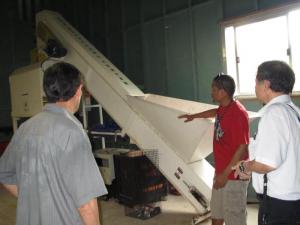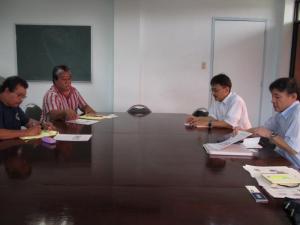Home > Research and Analysis > Research > Fiscal Year 2011 > JICA Partnership Program in Palau
Main content starts here.
Update:November 4, 2011
JICA Partnership Program in Palau
Country: Republic of Palau
Sponsored by: Japan International Cooperation Agency (JICA)
Duration of Survey
JICA Teleconference: May 13, 2011
Survey on the Current Situation: June 12 (Sun.) to 18 (Sat.), 2011
Background:
The Republic of Palau consists of some 200 islands. The country has a population of about 20,000, 70 percent of whom live on Koror Island in the state of Koror. The second most populous is Babeldaob Island, the largest island of the country, inhabited by nearly 25 percent of the population. Native Palauans constitute approximately 70 percent of the entire population, and the majority of the rest are Filipinos. ICETT’s survey was intended for three states: Koror with a population of 12,676, Airai, the second most populous state, on Babeldaob Island with 2,723, and Aimeliik on Babeldaob Island with 270.
ICETT applied for the JICA Partnership Program (Local Government Type) to promote the “Integrated Program for Environment-friendly Compost Systems in the Republic of Palau”. The application was selected after a screening process. Under the guidance of the JICA Chubu International Center, the JICA Palau Office, and experts on Palau, ICETT implemented the selection of appropriate counterparts and investigated the current situation in the states of Koror, Airai, and Aimeliik.
Survey on the current situation:
Since each state government, not the Palauan central government, is responsible for the management of waste, the state governments are ICETT's best counterparts for the program. Within each state, ICETT narrowed down the target areas of the current survey to examine the possibilities of how to best introduce and expand the environmentally friendly compost program in the future.
Especially the state of Koror is regarded as one of the areas well-suited for this program. There are 25 stations to sort household garbage in the state, and the waste is collected by the state government. However, collected waste appears not to be appropriately sorted. Not the whole area of the state is covered by the collection system, so the state has been planning to increase the number of stations and awareness of the necessity to sort garbage properly.
In Koror, there are a large compost center and a recycling center under neat management. Garbage is collected at resort hotels. Compost produced at the center is sold back to the hotels for gardening. ICETT believes that its program will be able to help get more of the areas that are not covered by the state’s current system to work in concert with the compost center.
In addition, ICETT had opportunities to exchange opinions and views with governors of Airai and Aimeliik.


For about a week, starting October 24 (Mon.), ICETT staff visited Palau again to conduct a full-scale investigation and compost demonstration, and confer with Palau Community College.







